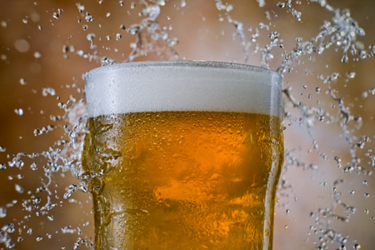Water Is Beer

By Jim Lauria

My water career started with beer. No, not the amount I drank on my way to my chemical engineering degree at Manhattan College. I mean the 10,000+ hours I spent optimizing filtration systems in breweries throughout the world. That included all the major breweries in North America and Europe, and while living in Hong Kong in the 1990s, I worked with many more in Asia and Australia. Mega-breweries, microbreweries, and everything in between...I visited them all.
The experience gave me more than an appreciation for malt and hops — the filtration expertise I was building translated well into the water treatment field. The real lightning bolt struck me more than a decade ago when my company became involved in the design of the NEWater plant, where PUB, Singapore's national water agency, recycles wastewater into potable water so pure that local microchip plants use it in their manufacturing processes. Some of that water has since been used as the foundation for NEWbrew, a line of craft beers from Brewerkz that brings a taste of NEWater to thirsty customers in Singapore and Indonesia.
If the water is pure enough for a microchip manufacturer, it's good enough to brew beer.
My fascination with filtration, municipal water treatment, and beer flowed together once again when I sampled Stone Brewing Co.'s Full Circle Pale Ale at the 2017 California WateReuse Conference in San Diego. Stone Brewing created Full Circle with recycled municipal water, putting a new spin on "toilet to tap" and proving that no matter what the folks at Coors say, good beer can start with water from somewhere other than Colorado mountain streams.
Certainly, the technology indicates that recycled water can be purified to any standard of safety and purity you want. (A 2022 study from Stanford University found recycled wastewater to be cleaner than other tap water precisely because of how rigorously it's treated.) We've seen it in San Diego, though there's an "ick factor" for many people, an overriding sense that drinking it is sort of a dare. But when you steep malt and hops in it, the "ick" fades at least long enough to prove the point. Water treatment experts can do in a recycling plant what Mother Nature does every day with the natural water cycle of evaporation, filtration through the soil, and aeration with waves and cascading streams. It's pretty amazing, really.
And since my first quaff of Full Circle Pale Ale, brewers around the world have been working toward a mixed case's worth of recycled-water brews. Ćížova Microbrewery in the Czech Republic worked with Veolia to brew ERKO Beer in 2019. Swedish brewers at the New Carnegie Brewery crafted a couple of sold-out batches of PU:REST with the help of staff from Carlsberg, the historic grand-daddy of beer innovators (whose brewers isolated the species of yeast used by nearly every beer brewer in the world). Xylem's water treatment prowess is showcased in Village Blonde from the University of Calgary in Canada, Renew Brew by Town Brewing in Wesley Heights, NC, and Reuse Brew from Berliner Wasserbetrieb in Germany's capital, which showed off Xylem's advanced oxidation process (AOP) treatment at a water reuse conference.
Closer to my home in California, I could grab a Kölsch called Epic OneWater Brew from Devil's Canyon Brewing Co. that uses gray water collected from a 40-story San Francisco high-rise and run through Epic Cleantec's combination of biological treatment and membrane filtration. Or there's Tunnel Vision IPA by Half Moon Bay Brewing, or in parched Scottsdale, Arizona, where a cold beer always hits the spot, Desert Monks Brewing Co. makes Sonoran Mist from recycled municipal water, which has had years of use watering the area's celebrated golf courses.
The bottom line is you don't have to be on a bender — or trying to win a bar bet — to enjoy beer made with recycled water. Over and over, brewers are taking the age-old case that good water makes good beer and applying it to recycled water. That's a lesson that's worth learning as more of us face looming water shortages. Archeologists and anthropologists have determined that beer represented some of humankind's earliest water treatment, slowly guiding humanity toward potable water. History may very well be repeating itself. Or recycling itself, if you will.
As the brewer for North Carolina's Town Brewing told WSOC-TV, using recycled water directly from Charlotte Water simply shortened the cycle — instead of the utility releasing the recycled water into the Catawba River and impounding it in a reservoir before delivering it to the brewery, the brewer got it as soon as it was treated.
We're actually starting to see the non-novelty future at Firestone Walker Brewing Company in Paso Robles, California, which has installed its own water recycling plant to treat water from their plant and help augment city water. They're not just proving a point; they're improving the water efficiency of the brewing process. They're taking water recycling mainstream.
I'll drink to that.
